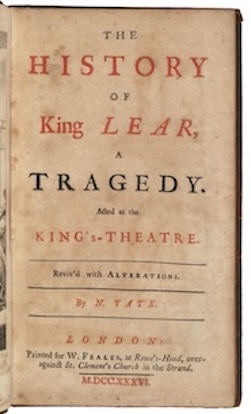Authors
 Today we think about authorship a bit differently than people did in the long eighteenth
century.
While we think of playwrights as having a kind of ownership over their dramatic works, this
wasn't always the case; sometimes, scripts were considered the property of the playing company
that bought them, and the author's name wasn't always known or advertised to the viewing public.
Audiences were much more interested in knowing which star actors would be performing in a play
than they were in knowing who wrote it. We might compare this to movie posters today, which are
more likely to name celebrity actors than screenplay writers.
Today we think about authorship a bit differently than people did in the long eighteenth
century.
While we think of playwrights as having a kind of ownership over their dramatic works, this
wasn't always the case; sometimes, scripts were considered the property of the playing company
that bought them, and the author's name wasn't always known or advertised to the viewing public.
Audiences were much more interested in knowing which star actors would be performing in a play
than they were in knowing who wrote it. We might compare this to movie posters today, which are
more likely to name celebrity actors than screenplay writers.
At the same time, it was not uncommon to adapt and revive old plays, sometimes in radical ways, and to continue marketing them under the name of the source author—especially if the source author was someone famous like William Shakespeare or John Fletcher. The London Stage, 1660-1800 doesn't always make it clear which version of a play is being performed on a given night, nor is it always possible to know.
For these reasons, a straightforward "author" search returning performances of plays known to be by a given author would be ill-suited to the performance culture of the period. In the London Stage Database, searching for an author will return performances of plays with the same title as those we know to be by that author, as well as performances of adaptations and related plays. Searching for "Shakespeare" will turn up performances of William Davenant and John Dryden’s 1670 operatic spectacle The Tempest, or, the Enchanted Island; David Garrick’s 1754 farce Catherine and Petruchio, which was based on The Taming of the Shrew; and Nahum Tate’s 1681 adaptation of King Lear that gave the tragedy a happy ending (see image). If you click through to a specific event and scroll to the mainpiece or afterpiece in question, you may find a list of "Related Works" that includes one or more plays related to the title performed on the evening in question. This feature may help you identify a list of several potential candidates for the performance text, or it may help you identify sources for and adaptations of the play we know was performed that night.
It is important to note that the attribution of "related works" to "authors" is ongoing; this data was not present in the recovered London Stage Information Bank, and its collection is still a work in progress by the members of the London Stage Database team.
Image Credit: Title page of The History of King Lear, a Tragedy, published in 1736 in connection with a revival of Nahum Tate's 1681 Shakespearean adaptation. Folger Shakespeare Library, CC-0 public domain license.